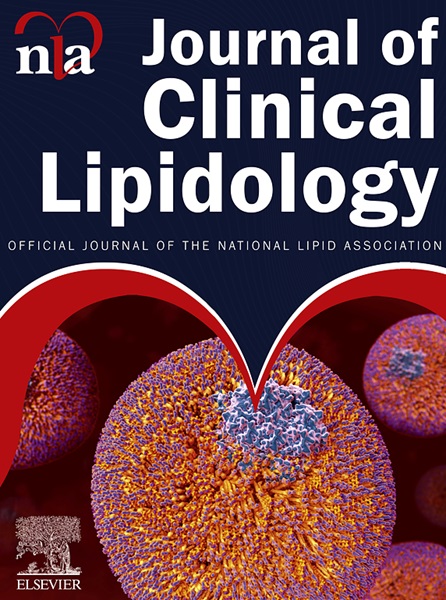A case report of hyperchylomicronemia and recurrent pancreatitis in a patient with the pArg333His variant of the lipoprotein lipase gene
IF 4.6
3区 医学
Q2 PHARMACOLOGY & PHARMACY
引用次数: 0
Abstract
Background/Synopsis
A 69-year-old African American male with severe hypertriglyceridemia, hyperchylomicronemia (> 4,000), and recurrent pancreatitis associated with the p.Arg333His variant of the Lipoprotein Lipase (LPL) gene. The patient did not respond to multiple triglyceride-lowering medications and continued to experience recurring episodes of pancreatitis. Severe hypertriglyceridemia, poor response to pharmacologic therapy, and history of recurrent pancreatitis prompted consideration of primary chylomicronemia. Genetic testing identified two single nucleotide variants of the LPL gene: p.Arg333His and a rare variant of unknown significance (VUS), p.His71Gln. Dietary control, collaboration with a nutritionist, and Orlistat have been successful.
Objective/Purpose
Show the correlation of likely pathogenic multivariant genes and the intersectionality of environmental factors’ roles in severe hypertriglyceridemia.
Methods
Due to the severity of the hypertriglyceridemia, we conducted cascade screening and genetic testing for the patient and family.
Results
Genetic testing identified the pathogenic pArg333His variant of the LPL gene, along with a 92nd percentile polygenic risk score for hypertriglyceridemia in the proband, resulting in a diagnosis of multifactorial chylomicronemia syndrome (MCS). A second variant of the LPL gene (p.His71Gln) was observed, and cascade screening revealed that this and the pathogenic gene variant were carried on different LPL gene alleles in the proband (compound heterozygote). A family member carrying only the p.His71Gln gene variant was found to have moderate hypertriglyceridemia despite a low polygenic risk score for hypertriglyceridemia.
Conclusions
Genetic testing identified a pathogenic variant LPL gene combined with a high polygenic risk score for hypertriglyceridemia, which led to the diagnosis of multifactorial hyperchylomicronemia. Cascade screening suggested the second LPL gene variant (p.His71Gln) in biallelic configuration to the pathogenic p.Arg333His variant contributed to the severity of the patient's hypertriglyceridemia. The genetic findings guided the treatment referral to a nutritionist, a 10-15% fat-restricted diet, and adherence to Orlistat, which inhibits fat absorption. The patient has maintained triglyceride levels below 400 mg/dL and no further episodes of pancreatitis. The novel p.His71Gln variant warrants further investigation to clarify its role in the pathogenesis of multifactorial chylomicronemia syndrome.
高乳糜微粒血症和复发性胰腺炎的病例报告与pArg333His变体脂蛋白脂肪酶基因
背景/简介一名69岁非裔美国男性,患有严重的高甘油三酯血症,高乳糜低血症(>;4000),以及与p.a g333his脂蛋白脂肪酶(LPL)基因变异相关的复发性胰腺炎。该患者对多种降甘油三酯药物没有反应,并继续经历反复发作的胰腺炎。严重的高甘油三酯血症,对药物治疗反应差,胰腺炎复发史提示考虑原发性乳糜小血症。基因检测鉴定出LPL基因的两种单核苷酸变异:p.a g333his和一种罕见的未知意义变异(VUS) p.h s71gln。饮食控制、与营养学家合作以及奥利司他都取得了成功。目的:探讨重症高甘油三酯血症中可能致病的多变异基因的相关性及环境因素的交叉作用。方法由于高甘油三酯血症的严重程度,我们对患者和家属进行了级联筛查和基因检测。结果基因检测鉴定出致病性LPL基因的pArg333His变体,以及先证者高甘油三酯血症的第92百分位多基因风险评分,从而诊断出多因素乳糜微粒血症综合征(MCS)。观察到LPL基因的第二个变异(p.His71Gln),通过级联筛选发现该变异和致病基因变异在先证者(复合杂合子)的不同LPL基因等位基因上携带。一名仅携带p.His71Gln基因变异的家族成员被发现患有中度高甘油三酯血症,尽管高甘油三酯血症的多基因风险评分较低。结论基因检测发现致病性变异LPL基因与高甘油三酯血症的高多基因风险评分相结合,导致多因素高乳糜低血症的诊断。级联筛选显示,第二种LPL基因变体(p.h his71gln)与致病性p.a g333his变体具有双等位基因配置,与患者高甘油三酯血症的严重程度有关。基因发现指导治疗转到营养学家,10-15%的脂肪限制饮食,并坚持奥利司他,抑制脂肪吸收。患者的甘油三酯水平维持在400mg /dL以下,没有胰腺炎的进一步发作。新的p.His71Gln变异值得进一步研究,以阐明其在多因素乳糜微粒血症综合征发病机制中的作用。
本文章由计算机程序翻译,如有差异,请以英文原文为准。
求助全文
约1分钟内获得全文
求助全文
来源期刊
CiteScore
7.00
自引率
6.80%
发文量
209
审稿时长
49 days
期刊介绍:
Because the scope of clinical lipidology is broad, the topics addressed by the Journal are equally diverse. Typical articles explore lipidology as it is practiced in the treatment setting, recent developments in pharmacological research, reports of treatment and trials, case studies, the impact of lifestyle modification, and similar academic material of interest to the practitioner.
Sections of Journal of clinical lipidology will address pioneering studies and the clinicians who conduct them, case studies, ethical standards and conduct, professional guidance such as ATP and NCEP, editorial commentary, letters from readers, National Lipid Association (NLA) news and upcoming event information, as well as abstracts from the NLA annual scientific sessions and the scientific forums held by its chapters, when appropriate.

 求助内容:
求助内容: 应助结果提醒方式:
应助结果提醒方式:


